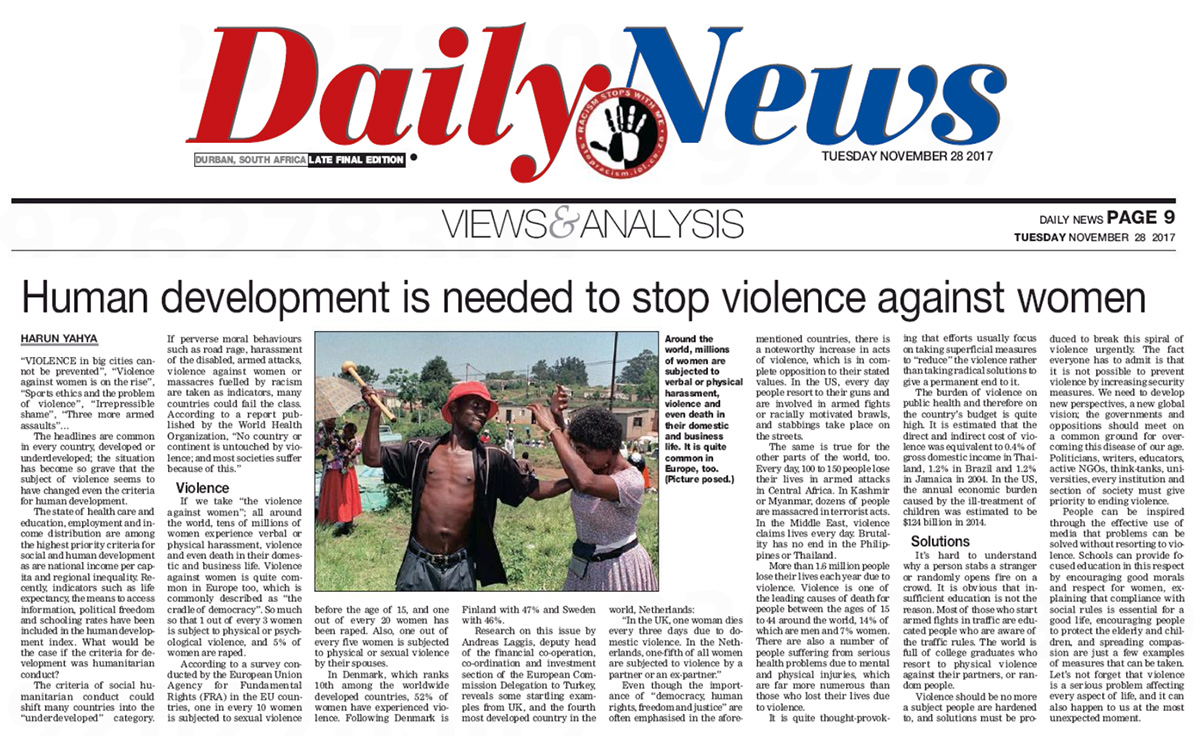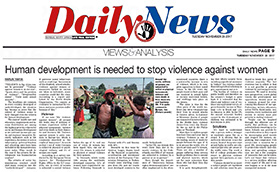
"Violence in big cities cannot be prevented," "Violence against women is on the rise," "Sports ethics and the problem of violence," "Irrepressible shame," "Three more armed assaults"...
The headlines are common in every country, developed or underdeveloped; the situation has become so grave that the subject of violence seems to have changed even the criteria for human development.
The state of health care and education, employment and income distribution are among the highest priority criteria for social and human development as are national income per capita and regional inequality. Recently, indicators such as life expectancy, the means to access information, political freedom and schooling rates have been included in the human development index. What would be the case if the criteria for development was humanitarian conduct?
The criteria of social humanitarian conduct could shift many countries into the "underdeveloped" category. If perverse moral behaviors such as road rage, harassment of the disabled, armed attacks, violence against women or massacres fueled by racism are taken as indicators, many countries could fail the class. According to a report published by the World Health Organization, "No country or continent is untouched by violence; and most societies suffer because of this."[1]
If we take ‘the violence against women’; all around the world, tens of millions of women experience verbal or physical harassment, violence and even death in their domestic and business life. Violence against women is quite common in Europe too, which is commonly described as "the cradle of democracy." So much so that 1 out of every 3 women is subject to physical or psychological violence, and 5% of women are raped. According to a survey conducted by the European Union Agency for Fundamental Rights (FRA) in the EU countries, one in every 10 women is subjected to sexual violence before the age of 15, and one out of every 20 women has been raped. Also, one out of every five women is subjected to physical or sexual violence by their spouses.[2]
In Denmark, which ranks tenth among the worldwide developed countries, 52% of women have experienced violence. Following Denmark is Finland with 47% and Sweden with 46%.[3]
Research on this issue by Andreas Laggis, deputy head of the financial cooperation, coordination and investment section of the European Commission Delegation to Turkey, reveals some startling examples from UK, and the fourth most developed country in the world, Netherlands:
"In the United Kingdom, one woman dies every three days due to domestic violence. In the Netherlands, one-fifth of all women are subjected to violence by a partner or an ex-partner." [4]
Even though the importance of "democracy, human rights, freedom and justice" are often emphasized in the aforementioned countries, there is a noteworthy increase in acts of violence, which is in complete opposition with their stated values. In the USA, everyday people resort to their guns and are involved in armed fights or racially motivated brawls, and stabbings take place on the streets.
The same is true for the other parts of the world, too. Every day, 100 to 150 people lose their lives in armed attacks in Central Africa. In Kashmir or Myanmar, dozens of people are massacred in terrorist acts. In the Middle East, violence claims lives every day. Brutality has no end in the Philippines or Thailand.
More than 1.6 million people lose their lives each year due to violence. Violence is one of the leading causes of death for people between ages of 15 to 44 around the world, 14% of which are men and 7% women.[5] There are also a number of people suffering from serious health problems due to mental and physical injuries, which are far more numerous than those who lost their lives due to violence.
It is quiet thought provoking that efforts usually focus on taking superficial measures to ‘reduce’ the violence rather than taking radical solutions to give a permanent end to it.
The burden of violence on public health and therefore on the country's budget is quite high. It is estimated that the direct and indirect cost of violence was equivalent to 0.4% of gross domestic income in Thailand, 1.2% in Brazil and 1.2% in Jamaica in 2004. In the United States, the annual economic burden caused by the ill-treatment of children was estimated to be $124 billion in 2014.[6]
It's hard to understand why a person stabs a stranger or randomly opens fire on a crowd. It is obvious that insufficient education is not the reason. Most of those who start armed fights in traffic are themselves educated people who are aware of the traffic rules. The world is full of college graduates who resort to physical violence against their partners, or random people.
Violence should be no more a subject people are hardened to, and solutions must be produced to break this spiral of violence urgently. The fact everyone has to admit is that it is not possible to prevent violence by increasing security measures. We need to develop new perspectives, a new global vision; the governments and oppositions should meet on a common ground for overcoming this disease of our age. Politicians, writers, educators, active NGO’s, think-tanks, universities, in short, every institution and section of society must give priority to ending violence.
People can be inspired through the effective use of media that problems can be solved without resorting to violence. Schools can provide focused education in this respect by encouraging good morals and respect for women, explaining that compliance with social rules is essential for a good life, encouraging people to protect the elderly and children, and spreading compassion are just a few examples of measures that can be taken. Let's not forget that violence is a serious problem affecting every aspect of life, and it can also happen to us at the most unexpected moment.
[1] http://www.who.int/violence_injury_prevention/violence/world_report/en/summary_en.pdf
[2] http://fra.europa.eu/en/speech/2014/violence-against-women-across-eu-abuse-home-work-public-and-online
[3] http://www.bbc.com/news/world-26444655
[4] http://www.hurriyet.com.tr/42-percent-of-turk-women-facing-abuse-10991382
[5] http://www.who.int/violence_injury_prevention/violence/world_report/en/summary_en.pdf
[6] ]WHO, Global status report on violence prevention 2014 http://www.who.int/violence_injury_prevention/violence/status_report/2014/report/report/en/
Adnan Oktar's piece in Daily News (South Africa)


